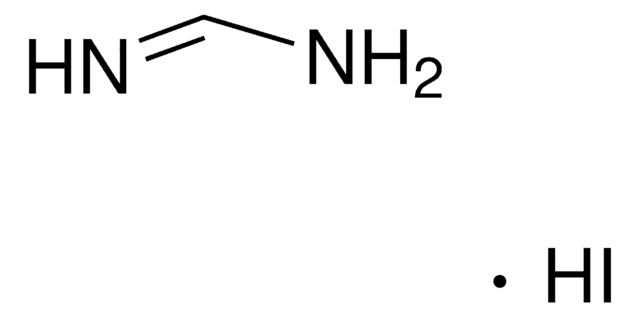793493
Methylammonium iodide
98%
Sinónimos:
Methanamine hydriodide
About This Item
Productos recomendados
Quality Level
assay
98%
form
powder
greener alternative product characteristics
Design for Energy Efficiency
Learn more about the Principles of Green Chemistry.
sustainability
Greener Alternative Product
mp
270-280 °C
greener alternative category
SMILES string
CN.I
InChI
1S/CH5N.HI/c1-2;/h2H2,1H3;1H
InChI key
LLWRXQXPJMPHLR-UHFFFAOYSA-N
¿Está buscando productos similares? Visita Guía de comparación de productos
Categorías relacionadas
Application
Other Notes
signalword
Warning
hcodes
Hazard Classifications
Acute Tox. 4 Oral - Eye Irrit. 2 - Skin Irrit. 2 - STOT SE 3
target_organs
Respiratory system
Storage Class
11 - Combustible Solids
wgk_germany
WGK 3
flash_point_f
Not applicable
flash_point_c
Not applicable
Certificados de análisis (COA)
Busque Certificados de análisis (COA) introduciendo el número de lote del producto. Los números de lote se encuentran en la etiqueta del producto después de las palabras «Lot» o «Batch»
¿Ya tiene este producto?
Encuentre la documentación para los productos que ha comprado recientemente en la Biblioteca de documentos.
Los clientes también vieron
Artículos
To achieve net-zero emissions by 2050, renewable power contributions must triple. Photovoltaic stations provide vital utility power, achieved primarily through third- and fourth-generation technology. Promising trends include recycling and revolutionary, ultra-lightweight, flexible, and printable solar cells.
To achieve net-zero emissions by 2050, renewable power contributions must triple. Photovoltaic stations provide vital utility power, achieved primarily through third- and fourth-generation technology. Promising trends include recycling and revolutionary, ultra-lightweight, flexible, and printable solar cells.
To achieve net-zero emissions by 2050, renewable power contributions must triple. Photovoltaic stations provide vital utility power, achieved primarily through third- and fourth-generation technology. Promising trends include recycling and revolutionary, ultra-lightweight, flexible, and printable solar cells.
To achieve net-zero emissions by 2050, renewable power contributions must triple. Photovoltaic stations provide vital utility power, achieved primarily through third- and fourth-generation technology. Promising trends include recycling and revolutionary, ultra-lightweight, flexible, and printable solar cells.
Nuestro equipo de científicos tiene experiencia en todas las áreas de investigación: Ciencias de la vida, Ciencia de los materiales, Síntesis química, Cromatografía, Analítica y muchas otras.
Póngase en contacto con el Servicio técnico












